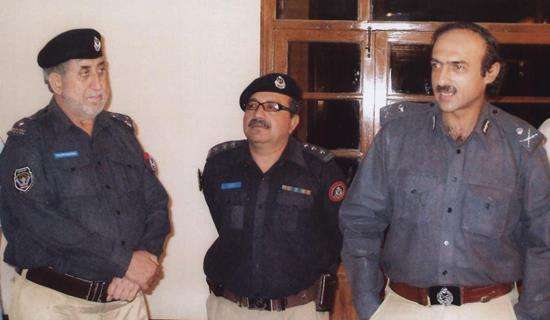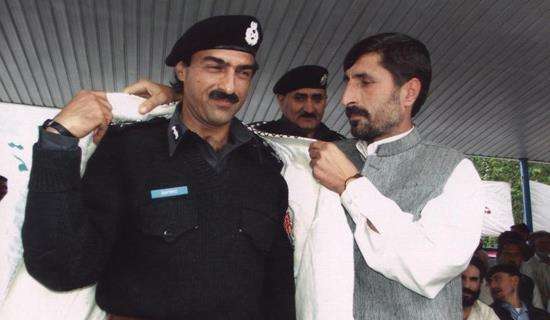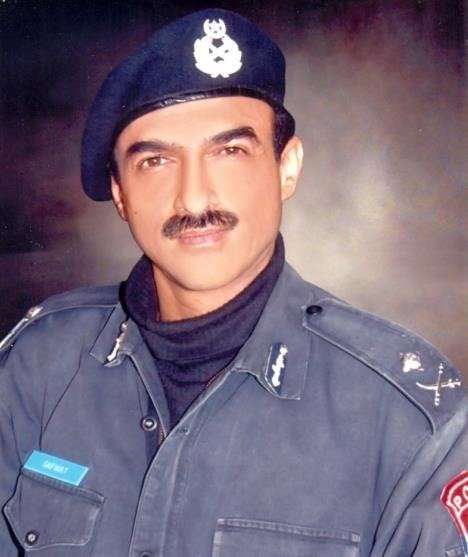August 04 was the fifth death anniversary of Safwat Ghayur. An army officer who met Safwat first time described him as “a lean man, with loosely fitted clothes, a hint of pattas (a pushtu word for hair coming down over the neck) peeping out from behind his beret, with a swagger in his gait, a sultry smile and a twinkle in his eye. He was a good looking person radiating confidence and authority”. This is the best description of a fine police officer and a gentleman who laid down his life to secure peace for his beloved city. He was killed in an attack on his vehicle by a suicide bomber in Peshawar on August 04, 2010 and the police lost one of its finest and bravest officers.
He started his career as Assistant Superintendent Police (ASP) in Peshawar, rising steadily to higher ranks serving as Superintendent of Police (SP), Senior Superintendent of Police (SSP), Assistant Inspector General (AIG) Criminal Investigations Department (CID), Inspector General (IG) Gilgit, Commandant of National Police Academy, Frontier Reserve Police (FRP), Intelligence Bureau (IB), DIG Peshawar range and Capital City Police Officer (CCPO). He died with his boots on as Commandant of the Frontier Constabulary. He was on his way to become Inspector General of Police (IGP) of Khyber-Pakhtunkhwa (KPK) when his life was cut short.
Safwat spent most of career in his hometown of Peshawar and started his fight against militancy in 1990s long before the rest of the country was aware of the danger. In 1997, he spearheaded the ‘Operation Garbage Dump’ to tackle foreign militants in Jalozai camp near Peshawar. In the last few years of his career, he was at the forefront of the battle against militants encroaching on the city from all directions. Peshawar was literally under siege from militants based in surrounding Khyber, Mohmand and Darra Adam Khel tribal territories. He never blinked and stood up with an ill equipped and poorly trained force against hard core militants. This was the time when more than half of the KPK police was equipped with World War II vintage .303 rifles while the militants were brandishing AK-47s, submachine guns and rocket launchers. He was always at the front risking his life to protect the citizens of Peshawar.
Safwat was from a well respected and well connected family. His close relatives include army officers, civil servants, ambassadors, politicians, ministers, governor, etc. He could have easily opted for a less risky and safe appointment but he decided to be in the trenches where the battle for the survival of Pakistan is being fought. He was one of the few officers whose heart and mind was in right place. There was no confusion and ambiguity. He saw the militants as a clear and present danger and carried out his duties with vigor and dedication.
As DIG Peshawar Range and CCPO Peshawar, he worked closely with Frontier Corps to secure the city. Safwat was not the kind of guy who would take a back seat. During an apex committee meeting which was chaired by Governor of KPK and his cousin Owais Ghani, he announced that he had subordinated himself to Inspector General of Frontier Corps (IGFC) and that all further instructions for him should be routed through IGFC. In September 2009, he was relieved of his duties due to medical reasons under intense pressure from his family and friends. However, a restless soul like Safwat could not be tamed and barely two months later when the opportunity came to be in the frontlines with his soldiers, he jumped in the fray again.
In December 2009, he was appointed Commandant of Frontier Constabulary. He was frustrated due to the fact that a large number of his force was deployed on protection duties of VIPs. He approached everyone who would listen and with the help of IGFC, he was able to get back about 40 platoons of Frontier Constabulary. Now, his next step was to improve training and administration of his force and lift the sagging morale. He was a hard task master but never asked from his subordinates what he wouldn’t do himself. He removed the dead wood very quickly and dismissed several platoons not up to the task in one go. He sacked about 30 platoons (around 900 soldiers). Once he turned around his force, he now went to the army and FC and asked for an opportunity to take his reconditioned constabulary into some operation to build up their operational confidence. He was assigned the task of cleaning up Kala Dhaka (a provincially administered tribal area) in Mansehra district that was the den of criminals and militants. After a successful operation there the Frontier Constabulary had a new look. Safwat began to pester IGFC for some more combat opportunities on a larger scale and was given the task of cleaning Pastawana area with the main objective around Tor Chappar in Darra Adam Khel. This Frontier Region (FR) of Peshawar and Kohat was at a strategic location and the local chapter of Tehreek-e-Taliban (TTP) used this area to launch attacks in Peshawar, Kohat, Nowshehra, Mardan and Attock. The operation named ‘Spring Cleaning’ was carried out in February-March 2010. A joint tactical HQ was established in Dara Adam Khel with a reserve Quick Reaction Force (QRF) of Frontier Corps, artillery and attack helicopters in support but they were never needed. Safwat was in-charge of the operation proudly commanding his constabulary and always leading from the front. Around 36 platoons of Frontier Constabulary did all the heavy lifting causing significant causalities to the militants and captured many alive.

One example is suffice to show that when properly trained, equipped and led by good officers, any group can be molded into a fighting force walking proudly. On the other hand, even a seasoned battalion with over a hundred year history when not properly trained and poorly led surrenders in dozens without firing a single shot. During operations in Darra, Safwat’s troops complained of their kheris (Peshawari chappals) falling apart. Since his establishment had a team of cobblers, he ordered them to follow in the wake of the operation carrying their implements and instruments for repairing the chappals. Some of the cobblers got lost in the mountains and came across a dozen militants who had fled after being given a good thrashing by the Frontier Constabulary troops. The militants, on seeing a different breed of troops equipped with menacing looking tools, quickly surrendered to the cobblers. It was a strange sight to watch when a group of cobblers with their heads held high mustered their prisoners into the camp in the evening. An army officer who worked with Safwat closely is of the view that ‘his standards of leadership were very high and visible and very rarely one come across such a man’.
Police of Khyber-Pakhtunkhwa has been at the forefront of the battle against militancy and have suffered heavily. Despite being poorly paid, poorly armed, poorly trained and no support from the population, brave policemen have performed beyond the call of duty. Many senior officers have died with their boots on. The list includes Deputy Inspector General (DIG) Malik Mohammad Saad (killed in a suicide attack in Peshawar city while protecting a Muharram Ashura procession), DIG Bannu Abid Ali (killed in an ambush in December 2006 when travelling from Peshawar to Bannu), SSP Hilal Ahmad Khan (killed in an attack on his vehicle in Chilas in August 2013), SP Iqbal Marwat (killed by a suicide bomber in Bannu police lines in February 2010), SP Abdul Kalam Khan (killed by a suicide bomber in March 2012), SP Khurshid Khan (killed by militants during an attack on a check post in October 2012), SP Hilal Haider (killed by a suicide bomber in November 2012), Deputy Superintendent Police (DSP) of Mardan Farid Hussain Bangash (killed in an encounter with militants in Mardan along with army comrades that included one of the finest cavalry officer and Sword of Honor winner at PMA Kakul Captain Meraj Muhammad Khan of 12th Cavalry then serving with FC), DSP Peshawar Khan Raziq (killed in a suicide attack in Peshawar city), DSP of Charsadda Bahadur Khan (killed in a suicide attack) and DSP Asmatullah Khattak (killed in an IED attack in Lakki Marwat in April 2009). The most heartbreaking story is of DSP of Lakki Marwat Javed Iqbal. He was killed in an IED attack in February 2008. His body was brought to his hometown in Swat for burial. A suicide bomber blew himself in the funeral procession of Javed killing his young son along with sixty other people. The brave father and son were buried together. Countless other policemen were killed in most brutal fashion (beheaded and mutilated) when militants took control of Swat.
Sacrifices of senior officers boosted the morale of policemen to a level that in one case a police constable on security duty at outer perimeter identified a suicide bomber, embraced and held him tightly to prevent the demon from entering the building fully realizing that he will be blown away. He willingly offered the supreme sacrifice. I cannot think of any police service in the world that has performed such a task. Police service of Pakistan can be proud of such men of honor. It is to the credit of policemen that they are performing their duty despite paucity of resources in these difficult circumstances. When the history of these trying times is written, the names of these policemen and fine men like Safwat Ghayur will be on the top of the list who decided to stand up and be counted while majority of their countrymen stood on the lines either due to fear or apathy.
Four months before his death, a family member and friend who visited him was shocked to see that Safwat had no personal security. His personal driver would go home on the weekend with Safwat driving his own car. When reminded about his personal safety, the response was typical of the man when he stated that “How can the people I am supposed to protect feel safe if I am myself showing fear? My safety comes after those of others I am tasked with protecting.” His other argument was that his men were needed for more important operations than being employed for his personal security. This was not out of a sense of invulnerability but of adherence to the principle that he was not going to use limited resources for his personal protection when each and every one of his men could be used in the field protecting others. He exercised due vigilance but personal security was the last item on his list. He was always mindful of how his actions would be perceived by others. Someone suggested that he should use the back entrance of the Frontier Constabulary headquarters for security reasons. Prompt came Safwat’s response that ‘I’m not a thief that I will be using the back door’. He was fully aware of the importance of personal conduct for keeping the morale of his own force as well as citizens of Peshawar in those dark days when everybody was fearful that Peshawar may fall to the vultures gathering from all directions. He always insisted that ‘I cannot show fear’.

On August 4, 2010, he was very happy as he had obtained an agreement from the authorities for the return of defective AK- 47s supplied to his organization by unscrupulous middlemen. He got out of his office with his driver and right next to his office, the light at the signal turned red. The policeman at the intersection waved at the car to cross as they approached the intersection with the light just turning red but Safwat, sitting in the front passenger seat, placed his hand on the driver’s indicating that he should stop. A young lad with six kilograms of explosives strapped to his body came close to the passenger side and blew himself thus extinguishing the spark of life from a fine officer and gentleman, a devoted husband and father of two young children.
Safwat’s father was a diplomat and he spent his early life in different countries. He was fluent in Arabic and French. He admired courage and bravery. This factor was very important for him and he would grudgingly admire courage among his adversary especially Arab fighters. On the other hand he had contempt for cowardice and when his own soldiers showed hesitation, he was quick to dismiss them from service. In 1997, he was serving in Traffic police and going on with his usual routine when he heard on wireless that police were engaged in a firefight with criminals, he turned his vehicle and rushed to the site of action. Soon he was in the middle of the shootout and got shot in the left shoulder. Later when the doctor finished his job, he told Safwat, ‘the good news is that it is your left shoulder and not right”. Safwat quipped “and the bad news is that I’m left handed”. Safwat was left handed and he worked hard to learn to use his right hand. It was during this injury that he got hepatitis from a tainted transfusion. Later, complications from the illness caused low platelets making him at risk for serious bleeding even with a minor injury. However, he was so immersed in his work of protecting his beloved city that he didn’t even travel hundred miles away to Rawalpindi to get treated by an expert physician. When pestered about the issue, he simply said that doctor can send me the medicines I need. He was a very light eater and got through a hectic daily schedule only on three Cs: Coke, Coffee and Cigarettes.
Dramatic decrease in violence all over Pakistan and especially KPK is only due to the sacrifices of men like Safwat and many others. I’m sure that when Safwat went up to heavens on August 04, 2010, he was greeted by his comrades from Frontier Constabulary with Eric Charles Handyside (Frontier Constabulary Commandant who was killed in an encounter on April 11, 1926) at the gate welcoming him with the words ‘well done boy’. The long line behind Handyside eager to shake hands with Safwat must have included many fellow Frontier Constabulary comrades and brave sons of the soil like Naib Subedar Khush Rang; Aka Khel Afridi, Naib Subedar Lal Khan; Malik Din Khel Afridi, Lance Naik Zulfiqar Khan; Shinwari, Havaldar Taj Khan; Mullagori, Naik Riaz Khan; Mohmand, Naik Dilawar Khan; Orakzai, Sepoy Khawaja Khan; Mahsud, Sepoy Noor Dad; Bizen Khel Wazir, Lance Naik Daud Khan; Bhittani, Sepoy Mir Baz Khan; Marwat, Lance Naik Wazir Hussain; Bangash, Sepoy Uzair Ahmad; Akora Khattak, Sepoy Adil Usman; Yusufzai, Sepoy Zahir Shah; Swati, Sepoy Noor Bahadur; Muhammadzai and Sepoy Shah Nazar; an Ismaili Chitrali. The guard of honor was likely presented by two groups of Frontier Constabulary soldiers. One line consisting of seventeen who died together (killed in an IED blast in Swat in 2007) and the other line of fifteen (killed in an ambush in July 2008 in Hangu). Garlands were likely brought by eight proud Bhittani soldiers (killed in a suicide blast in Islamabad in April 2009) as well as seven brave Marwat soldiers (killed in a suicide attack in Lakki Marwat in January 2010). In the end Safwat would have reached a large crowd of seventy eight giggling Pathan lads barely out of their teenage years welcoming him home (78 Frontier Constabulary recruits waiting outside their training center in Shabqadar to go home after passing out parade were killed by two suicide bombers in May 2011). All the citizens of Pakistan, Pushtuns and Peshawaris can be proud of Safwat.
We challenged Death.
He threw with weighted dice.
We laughed and paid the
forfeit, glad to play-
Being recompensed beyond
our sacrifice
With that nor Death nor
Time can take away.’
Robert Ernest Vernede
Acknowledgements
Author thanks many friends, family members and comrades who provided valuable information about the life and career of a proud son of the soil. Errors and omissions are author’s sole responsibility. The names of fallen soldiers of Frontier Constabulary are from organization’s website.
Rogue Warrior was Safwat’s favorite comic series




